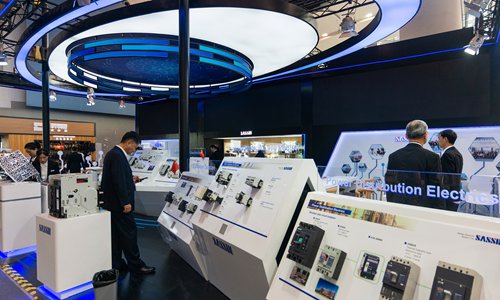HOME >> BUSINESS
Chinese exporters get stronger amid trade war
By Song Lin in Guangzhou and Chu Daye in Beijing Source:Global Times Published: 2019/10/15 22:13:40
Multiple strategies mean better ability, confidence for Canton Fair’s Chinese businessmen

A view of the Canton Fair in Guangzhou, capital of South China's Guangdong Province on Tuesday. Photo: VCG
Chinese exporters are adapting their strategies from diversifying their target markets to upgrading their offerings to cope with a harsh winter for global trade in which "survival of the fittest" is more true than ever.
At the China Import and Export Fair, China's largest trade fair - also known as the Canton Fair - exporters and traders told the Global Times that as customers in the US stopped, reduced or tried to renegotiate orders, they tried to maintain their presence in the market by upgrading, staying lean and opening up new avenues for sales.
There was a palpable calm among entrepreneurs at the fair, held in Guangzhou, South China's Guangdong Province, as the latest trade talks between the world's two largest economies made progress toward a so-called "phase-one" deal.
China's largest trade fair opened its 126th session on Tuesday in Guangzhou, South China's Guangdong Province. The fair has attracted 642 enterprises from 38 countries and regions to participate.
Staying alive
"We were restructuring our market layout long before the trade war began," Ou Yangkai, business director of Sichuan Machinery Import & Export Co (SCTOOLS), told the Global Times on Tuesday.
SCTOOLS has a 40-year-old history, and it sells its products to well-known US companies such as Home Depot.
The company managed to keep all of its US customers, even as the Trump administration levied tariffs on a wide variety of Chinese goods. US customers chose instead to reduce their inventories and watch the development of the trade talks.
The company's sales in the US dropped 28 percent year-on-year from January to September but sales in other markets rose 35 percent, according to Ou, who said sales in the sector are on average down 30 percent year-on-year.
"Our customers want us to give up some margins and walk through this tariff nightmare together," Ou said. "Our margins are also thin. We told them we would provide them with more and better offerings instead."
Trade friction has dragged down global merchandise trade to its slowest pace in a decade, to an estimated 1.2 percent in 2019, according to a WTO report. That forecast is 1.8 percentage points lower than 2018 actual figure.
Wei Guoxian, founder of Jiangsu Shengli Tools Co, a Chinese hardware tools producer that exports 95 percent of its products to markets such as the US, Europe and Southeast Asia, said that the company has been trying harder to expand its market to compensate its losses in the US, which used to be its largest overseas market.
"We haven't seen one order from the US so far this year but overall, we have actually seen an increasing number of customers this year," Wei told the Global Times on Tuesday.
"Since the China-US trade war broke out, we started to make effort to expand other overseas markets, especially emerging markets along the routes of the Belt and Road Initiative to include customers in Russia, Sri Lanka and Pakistan," Wei said.
In the meantime, his company has changed its strategy in the US to seek higher-level customers using improved products, which will generate more profits to deal with that higher tariffs that eat into margins, noted Wei.
China managed to post stable expansion in foreign trade for the first three quarters of this year, despite slowing global economic and trade growth and rising complexities in the global landscape.
In yuan-denominated terms, China's foreign trade expanded 2.8 percent year-on-year from January to September, according to data released by Chinese customs . Exports rose 5.2 percent to 12.48 trillion yuan ($1.76 trillion). In US dollar terms, exports to the US fell 10.7 percent from a year earlier.
The GAC attributed the situation to the generally stable growth of the domestic economy, the implementation of trade-stabilizing policies and diversification efforts that underpinned trade growth.
Become stronger
"As we upgrade and become more competitive, some of our former customers have gradually become rivals… This requires Chinese manufacturers like us to enhance ourselves and seek higher-level customers in the industrial chain," Ou said, adding that these goals are held by every company.
To open up new venues, SCTOOLS has set up companies or joint ventures in Italy, India and the US to get its organizations, inventories and after-sales services close to customers.
"Our American partners have stopped giving us orders. But we are OK with that... we just do what is required to stay in business," said Wei.
"Now we have the same high-level products as other countries, such as Japan or Germany, and we have the confidence to compete with them in terms of quality," Ou said.
Newspaper headline: Exporters get stronger amid trade war